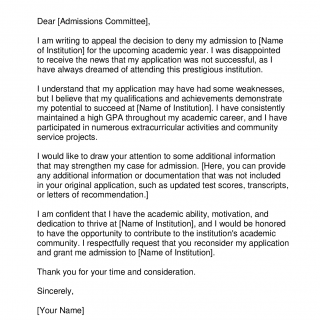Admission Appeal Letter
A Comprehensive Guide to Writing an Effective Letter
An admission appeal letter is a written document submitted by a prospective student to challenge a college or university's decision to deny admission. The main purpose of the letter is to request a reconsideration of the admission decision and potentially secure admission to the desired institution.
Parts of an Admission Appeal Letter:
- Introduction: The letter should begin with a polite and respectful greeting to the appropriate person or department.
- Explanation: The applicant should explain their strong desire and qualifications for admission, addressing any concerns or weaknesses in the application.
- Supporting Documentation: The applicant may provide additional supporting documentation or testimonials to strengthen their case.
- Conclusion: The letter should end with a polite request for reconsideration and a thank you for the recipient's time and consideration.
Important Fields to Consider:
- Applicant Information: The applicant should provide their full name, contact information, and any relevant identification numbers.
- Institution Information: The applicant should provide the name and address of the institution they are appealing to.
- Admission Decision: The applicant should clearly state the admission decision they are appealing and the reasons for the appeal.
The applicant may attach additional documents to support their appeal, such as transcripts, test scores, letters of recommendation, or personal statements.
Sample of Admission Appeal Letter
Dear [Admissions Committee],
I am writing to appeal the decision to deny my admission to [Name of Institution] for the upcoming academic year. I was disappointed to receive the news that my application was not successful, as I have always dreamed of attending this prestigious institution.
I understand that my application may have had some weaknesses, but I believe that my qualifications and achievements demonstrate my potential to succeed at [Name of Institution]. I have consistently maintained a high GPA throughout my academic career, and I have participated in numerous extracurricular activities and community service projects.
I would like to draw your attention to some additional information that may strengthen my case for admission. [Here, you can provide any additional information or documentation that was not included in your original application, such as updated test scores, transcripts, or letters of recommendation.]
I am confident that I have the academic ability, motivation, and dedication to thrive at [Name of Institution], and I would be honored to have the opportunity to contribute to the institution's academic community. I respectfully request that you reconsider my application and grant me admission to [Name of Institution].
Thank you for your time and consideration.
Sincerely,
[Your Name]
An applicant who was denied admission to their top-choice school may submit an admission appeal letter to request reconsideration. An applicant who was waitlisted may submit an admission appeal letter to express their continued interest in the institution and provide additional information to strengthen their case.
Strengths, Weaknesses, Opportunities, and Threats:
- Strengths: An admission appeal letter provides an opportunity for applicants to advocate for themselves and potentially secure admission to their desired institution.
- Weaknesses: The success rate of admission appeal letters is relatively low, and the process can be time-consuming and stressful for applicants.
- Opportunities: An admission appeal letter can demonstrate an applicant's determination and commitment to their academic goals.
- Threats: If an applicant's appeal is unsuccessful, it may negatively impact their relationship with the institution and their future academic prospects.
Related and Alternative Forms:
- Other forms of appeal may include a phone call or in-person meeting with an admissions representative.
- Alternative forms of admission may include transferring from another institution or applying to a different program or school.
The success or failure of an admission appeal letter can have a significant impact on an applicant's academic and professional future. If an appeal is successful, the applicant may have the opportunity to attend their desired institution and pursue their academic and career goals. If an appeal is unsuccessful, the applicant may need to consider alternative options and adjust their academic and career plans accordingly.
Admission appeal letters are typically submitted via mail or email to the appropriate department or individual at the institution. It is important for applicants to keep a copy of their letter and any supporting documentation for their records. The institution may keep a copy of the letter and documentation in the applicant's file for future reference.

